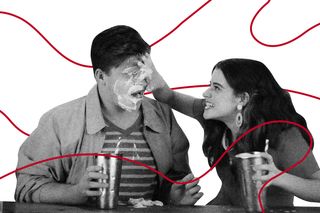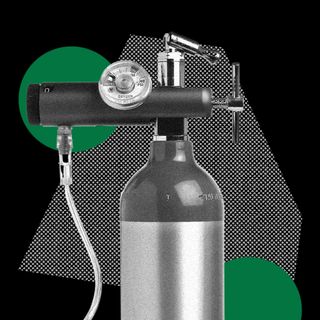
A Sex Ed Video Is Explaining Consent by Comparing Women to Milkshakes. The Lesson Is Concerning
Critics say “it fails to really address the nuances of this complex issue of consent.”

A sex education campaign recently launched by the Australian government is the talk of the town, for all the wrong reasons. To explain sexual consent to teenagers, a series of videos use couples forcing milkshakes, tacos, and pizzas on each other — and never once mentions the word ‘sex.’ Activists have called the video “bizarre” and “concerning,” pointing out that such metaphors compare women to consumable object, trivialize rape and sexual assault, and stray far from the nuances around consent.
The debacle is evidence of how far society has come since 2015, when Emmeline May’s public service comic explaining sexual consent via a cup of tea was feted on- and offline by women’s rights and sex ed activists for its clear, simple breakdown of the concept. It also provides an example of what not to do for India, as schools and educators across the country are mulling over and inching towards experimenting with diverse sex-ed curricula in classrooms.
Published on The Good Society, an Australian government website, the new videos are part of a public program for children between the ages of 13 and 17. The campaign aims to teach them about “respectful relationships.” One of the puzzling scenarios shows a teenage girl smearing a milkshake on her boyfriend’s face, without his permission. The video uses this, and other premises of ordering pizza and “touching your butt,” as situations where one should seek permission first — because eating pizza and touching someone’s butt are equivalent in scale and gravity, one would infer.
Another video aiming to establish the concept of respecting someone’s decisions shows a young girl on the fence about swimming with sharks; as a boy tries to convince her, the overarching message is that he should respect her desire and decision to be safe.
While there’s something to be said for discussing consent as a life value in a context larger than sexual relations, the video does not accomplish that. Women’s rights activists, sex educators, and commentators have responded to the campaign swiftly and severely. “Young people deserve consent and respectful relationships training that practically and explicitly helps them understand how to ethically navigate relationships,” Fair Agenda, a gender equality advocacy group, told the BBC. The organization has launched a petition to have the videos removed.
Related on The Swaddle:
We Will Soon Have Sentient Sex Robots. Will They Be Able To Consent?
Critics have been having a field day on Twitter, calling out the video for everything from making a simple concept even more confusing to equating women with objects like a milkshake to not using the words sex and rape.
The Australian government has defended the videos and the sex education campaign they’re a part of. “These materials will provide additional support to better educate young Australians on these issues and have been designed to complement programs already being offered by states and territories,” Education Minister Alan Tudge said when announcing the campaign last week. However, after an investigation revealed the government had spent $3.7 million on the campaign, officials took down two of its videos — the milkshake one amongst them.
The lightning rod reaction to a presumably well-intentioned (if not well-thought-out) campaign shows the progress in mainstream conversations about sex and relationships over the past several decades. In 2015, a PSA comic out of the U.K. that explained sexual consent similarly to the Australian videos, but using a cup of tea instead of a milkshake, was greeted with acclaim as original and innovative by activists and laypeople.
“The comparison is not only effective, it quite clearly condemns any attempts to claim murkiness around the subject,” an AdWeek article gushed over the “brilliant” video-cartoon at the time.
“Brilliant video, share with everyone you know!” tweeted the National Society for the Prevention of Cruelty to Children, a U.K. charity, back then.
Given this reception, it’s understandable how the current campaign may have felt its approach was inspired. But trying to recreate something six years after the fact ignores the fact that public understanding and discourse have moved on — particularly among younger generations. Today’s youth has come of age in the era of #MeToo and protests against sexual violence around the world.
Against this backdrop of knowledge, relying on a milkshake to explain consent seems at best quaint, at worst hopelessly out of touch and mis-educational. As Indian education and society slowly move toward accepting the necessity of comprehensive sex education for students, we would do well to take note — much like sexual consent, there’s a right way and a wrong way to do it.
Saumya Kalia contributed reporting to this article.
Liesl Goecker is The Swaddle's managing editor.
Related


Why Do Virtual Meetings Leave Women More Exhausted Than Men?
